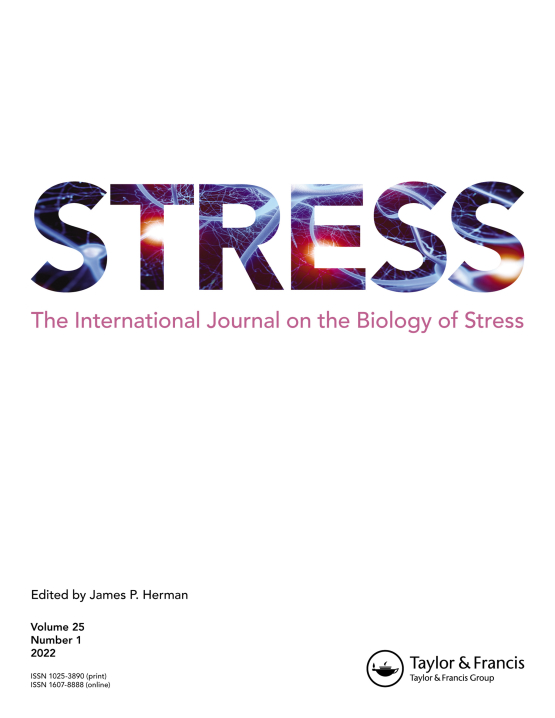Submit a Manuscript to the Journal
Stress
For an Article Collection on
Stress and sex: gonads, hormones, and receptors
Manuscript deadline


Article collection guest advisor(s)
Dr. Brent Myers, PhD,
Colorado State University, United States
brent.myers@colostate.edu
Dr. Aaron Jasnow, PhD,
University of South Carolina School of Medicine, United States
aaron.jasnow@uscmed.sc.edu
Stress and sex: gonads, hormones, and receptors
Emerging evidence indicates that the processing of stressors and subsequent biological responses are modulated by sex-specific factors, including gonadal hormones and receptors. This article collection brings together research examining how sex hormones like estrogens, progestogens, and androgens influence responses to stress across molecular, cellular, circuit, and behavioral levels. By highlighting interactions between stress and gonadal factors, this collection provides insight into the sex-dependent mechanisms affecting stress-related physiology and pathology. These findings collectively underscore the importance of considering sex as a factor in stress research, opening avenues for targeted therapeutic approaches.
Understanding the biological mechanisms responsible for the interplay of stress and sex is essential for advancing personalized approaches in mental and physical health. Stress-related disorders, such as anxiety, depression, and metabolic dysfunction, have differing prevalence and symptom expression between males and females, influenced in part by hormonal status and receptor signaling across the lifespan. Gonadal hormone receptors modulate fundamental aspects of the stress response, including synaptic signaling, hypothalamic-pituitary-adrenal (HPA) axis activity, and autonomic function. These effects vary widely depending on factors such as age and reproductive stage, affecting the susceptibility and resilience to stressors. This article collection aims to advance understanding of sex-specific stress responses, promoting more effective treatments for stress-related conditions.
This article collection is open to all aspects of the interactions between stress biology and sex-based factors, focusing on the role of gonadal hormones and receptors. Topics include, but are not limited to, the modulation of the HPA axis by sex hormones, the influence of gonadal hormones on stress-related neural plasticity, receptor-mediated effects on stress perception and coping strategies, as well as consequences for systemic function. Further, we invite studies examining sex-specific vulnerability to stress-related disorders, such as anxiety, depression, PTSD, and cardiometabolic disorders. A range of article types are welcome, including original research articles presenting new empirical data, as well as review articles and perspectives synthesizing current findings or offering conceptual/theoretical insights.
Instructions for Authors
The following Article Types will be considered: original articles, short communications, review articles, perspectives, letters to the editor, commentaries and book reviews.
When submitting your article, please select the Article Collection, ‘Stress and sex: gonads, hormones, and receptors’ from the drop-down menu on the submission system.
Dr. Brent Myers, PhD is Associate Professor in the Department of Biomedical Sciences at Colorado State University. Dr. Myers’s research is generally focused on the integrative neuroscience of stress. Specific projects combine neurocircuit analysis with behavioral neuroscience, endocrinology, and cardiovascular physiology to determine the mechanistic basis of stress effects on health.
Dr. Aaron Jasnow, PhD is Associate Professor in the Department of Pharmacology, Physiology & Neuroscience at the University of South Carolina School of Medicine. The Jasnow Lab mission is to understand how brain circuits control agonistic behavior, learning and memory. We are most interested in brain mechanisms controlling how animals, including humans, learn about fear and how these memories are processed, stored, reorganized, and recalled, to control emotional behavior.
Disclosure statement: The Guest Advisors declare no conflict of interest regarding this work.
Benefits of publishing open access within Taylor & Francis
Global marketing and publicity, ensuring your research reaches the people you want it to.
Article Collections bring together the latest research on hot topics from influential researchers across the globe.
Rigorous peer review for every open access article.
Rapid online publication allowing you to share your work quickly.
Submission Instructions
All manuscripts submitted to this Article Collection will undergo desk assessment and peer-review as part of our standard editorial process. Guest Advisors for this collection will not be involved in peer-reviewing manuscripts unless they are an existing member of the Editorial Board. Please review the journal Aims and Scope and author submission instructions prior to submitting a manuscript.
